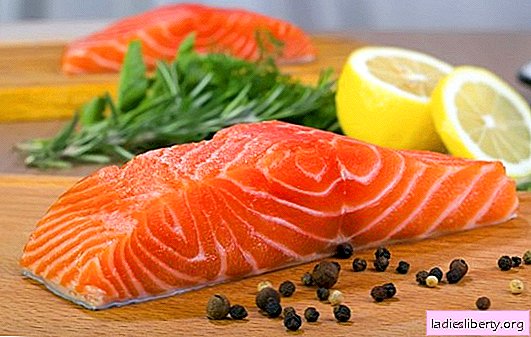
Salmon has excellent taste, it is always on sale, it is easy to cook. If some seafood is included in the daily diet, then why not salmon?
Moreover, much can be said about its benefits.
The relationship of salmon composition and benefits
Another name for salmon is lake (Atlantic) salmon. Well, “salmon” is a collective name for many fish. And just the salmon is most often considered for real salmon.
She was always appreciated as a fishing gift of the water world - for meat and red caviar.
Salmon lives in the sea, and swims in rivers to spawn. Small gray-silver scales on a thin skin on the back turn into a bluish tint and dark spots emphasize a strong elongated body to the lateral longitudinal line.
Salmon fillet is very tasty, tender, without the characteristic fishy smell and taste and with a minimum of bones. You can cook it as you like, including steaming, baking in a foil with vegetables, cooking fish soup, steaks from large chunks of fish, stewing and scrolling salmon for minced meat for cutlets. In Japanese cuisine, it is popular raw and lightly salted. Smoked is a delicacy. It happens and canned.
In the wild, salmon fishing is strictly controlled in many countries to preserve its population, and for the same purpose and for convenience it is generally bred on farms.
Salmon became one of the first fish to undergo genetic modification, and such individuals have already passed veterinary and scientific control, proving their harmlessness.
It is noteworthy that during heat treatment, salmon does not lose either the amber-pink color of the fillet, nor its nutritional, beneficial qualities.
Modern doctors, scientists and nutritionists unanimously recognize its value as an almost perfect fish product for medical, dietary and simply healthy nutrition.
Salmon is a source of easily digestible protein that even competes with poultry protein, so it can be recommended for protein diets.
But the carbohydrate content in this fish is zero, which resets its glycemic index, and this, in turn, makes salmon a good choice for a table for diabetes.
Omega-3 polyunsaturated fatty acid can be called the “pearl” of salmon.
Being one of its main sources among animal foods, salmon, therefore, is useful for:
• normal blood coagulation;
• functioning of the nervous system;
• body resistance to skin diseases, including eczema;
• prevention of heart disease.
The salmon contains a high content of melatonin, partly known for stimulating cell renewal and the production of hormones of good mood, but more for being able to set up an internal “clock”, for example, to replace insomnia with a healthy sleep.
Of the minerals in salmon, the content of sodium, potassium and iodine is high, as well as:
• phosphorus, indispensable for the functioning of the kidneys and the health of the skeletal system (including teeth);
• magnesium, which is able to prevent respiratory diseases, including serious ones such as bronchial asthma (magnesium deficiency is one of the factors that provoke it) and pneumonia as a result of hypothermia.
When salmon benefits are especially pronounced
There are few areas of human health that would not be affected in the positive sense by regular use of salmon. Its general strengthening effect covers the body literally at the cellular level. Salmon is useful, in particular, for the following:
• strengthening the musculoskeletal system;
• prevention of vision diseases (thanks to vitamin A);
• improving the condition of the skin, hair and nails (due to the combination of vitamins A and E);
• the production of melanin, which is responsible for protecting the skin from harmful radiation from the sun;
• strengthening immunity;
• preventing the formation of both benign and malignant tumors.
Great benefits of salmon for the brain:
• memory improvements for large amounts of information without distortion;
• Alzheimer's prevention;
• Improving the ability to analyze and find innovative solutions.
The importance of salmon in its caviar
Talking about salmon, it is impossible to forget about red caviar, it is not just a delicacy, but also a storehouse of substances created by nature for the formation and development of fish embryos.
It’s enough to feast on it only 2-4 times a week for several teaspoons, and this is not worse than any vitamin-mineral complex, it will improve metabolism, strengthen immunity, support blood formation, the work of the heart, brain and spinal cord.
Red caviar has another effect:
• promotes deeper breathing, lung health and their resistance to the harmful effects of the environment (including cigarette smoke, urban pollution, cold and moist air in autumn and winter);
• saturates cells with oxygen;
• lowers cholesterol;
• relieves inflammatory processes of any origin;
• prevents cramps (as a symptom of various diseases).
What could be the harm from salmon on an everyday table
It is known that allergic reactions do not always cover the whole group of similar products. Such is the salmon - with intolerance to a number of fish species, it is it that often turns out to be the gift of the water world, to which there is no allergy. It is important to remember that the method of processing fish can affect the manifestation of allergies, for example, someone will be harmed by salted salmon, but steamed or baked, will not cause rejection.
Raw, slightly salted and smoked fish using simplified technologies can cause parasites to infect humans, this risk is almost always, but then again, parasites are rare in salmon, and if its producer was also conscientious in sending fish for veterinary control, there is a chance of infection lower.
Salmon - single-frozen fish - repeated ones destroy all vitamins in it.
The calorie content of salmon when frying in oil increases by more than 50% compared to raw, so for people who are prone to weight gain and obesity, the harm of salmon can occur when carried away by certain recipes. If you choose the first dish of fish - the harm of salmon in this regard will still decrease - the energy value of the same fish soup can be at the level of 70-100 kcal per 100 g of dish.
Whether to prefer farm or wild salmon is a moot point.
On the one hand, GMO salmon are bred on farms, and even a simple feed can contain antibiotics, growth accelerators and dyes. On the other hand, a fish caught in the wild can, depending on its habitat, accumulate mercury and other harmful substances in the fillet, which are so rich in the world's waters from human activities.
Salmon, as already emphasized, is very useful for the prevention and treatment of many diseases, but individual disorders require caution, restrictions on its use, and sometimes (according to the doctor’s decision) and the complete rejection of this fish:
• diseases of the urinary system and kidneys in particular - with them there is harm from salted salmon, which can retain water in the body and provoke edema;
• increased pressure imposes a ban on frequent treats of cold smoked salmon;
• also, it is undesirable in the diet for serious liver diseases.











